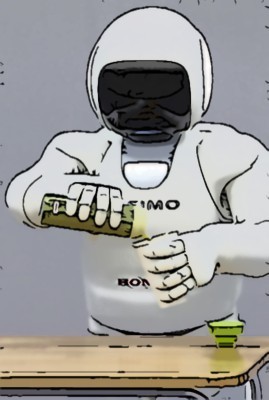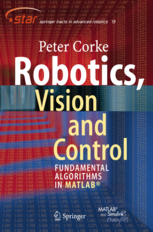Introduction to Intelligent Robotics
Introduction to Intelligent Robotics INFO0948 is a Master's course that I created and taught at ULiege in 2013–2018. The course explains the basic concepts that allow robots to build a world representation from sensory data, and to plan and perform complex tasks such as navigating a building, or manipulating tools.
Introduction to Intelligent Robotics INFO0948 is a Master's course that I created and taught at ULiege in 2013–2018. The course explains the basic concepts that allow robots to build a world representation from sensory data, and to plan and perform complex tasks such as navigating a building, or manipulating tools.
I no longer teach this course. This page is obsolete. The course is now taught by Pierre Sacré, see the course page on Pierre’s website, or the ULiege INFO0948 syllabus.

Course Material
- Slides and Homework (no longer available)
- Group Project: Setup instructions, project details.
- INFO0948 ULg Course Page (course contents, objectives, etc.)
Group Project
Setup instructions and project details are on the TRS website: http://teaching-robotics.renaud-detry.net/trs.
Objectives
At the end of this course, student will be able to solve the following problems:
- Extract information from video streams (object/people identity/position, body postures, 3D room and object structures)
- Infer a useful behavior from sensory data (navigation, grasping; via optimization, machine learning, or control)
- Generate a set of robot commands that implement the desired behavior.
A group project allows students to gain practical experience. In this project, students will program a robotic agent that processes images, plans a task based on the image data, and executes a set of motor commands that complete the task. The robot will be simulated in the V-REP simulator.
We are currently discussing with Kuka the possibility of borrowing a youBot for a month, to allow groups (some, maybe not all) to implement their work on a real robot.
Required Readings

The course is largely based on the book Robotics, Vision and Control: Fundamental Algorithms in MATLAB, written by Peter Corke, published by Springer in 2011.
Getting the book:
- E-book freely available on Springer Link. You need to be connected to the internet from within the ULg in order to download the ebook for free. The download page should look like this.
- Prints for sale for about 55EUR, for instance on Amazon.fr.
- If the course attracts enough students, we will consider negotiating a discount with a local bookstore.
Going Further
The books listed below are good complements to P. Corke’s Robotics, Vision and Control.
- Maja J. Mataric. The Robotics Primer. MIT Press, 2007.
- Roland Siegwart, Illah Reza Nourbakhsh and Davide Scaramuzza. Introduction to Autonomous Mobile Robots, second edition. MIT Press, 2011.
- Sebastian Thrun, Wolfram Burgard and Dieter Fox. Probabilistic Robotics. MIT Press, 2005.
Related Courses
- ELEN0062 Apprentissage inductif appliqué - Pierre Geurts, Louis Wehenkel
- ELEN0016 Traitement numérique d’images - Marc Van Droogenbroeck
- SYST0003 Linear control systems - Raphaël Fonteneau
- PROT0430 Robotique biomédicale et prothèses actives - Olivier Bruls
- MECA0031 Cinématique et dynamique des mécanismes - Olivier Bruls
Students are encouraged to concurrently follow the course Applied Inductive Learning. (Applied Inductive Learning is however not a prerequisite.)